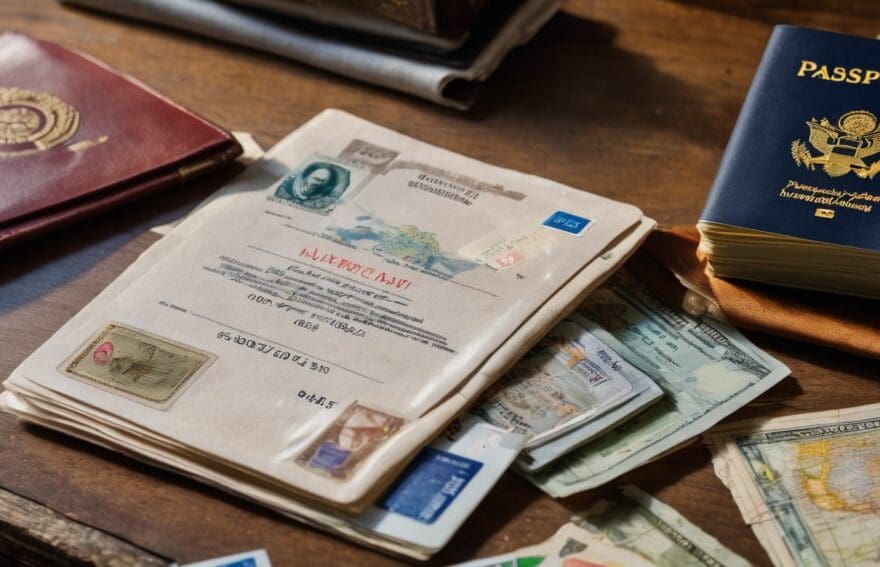Papers, Please: The Dilemmas of Border Control

Updated On: November 08, 2025 by 
Navigating the complex world of border control can often feel like traversing a moral maze. We understand the weight of such decisions; painstakingly poring over details as you’ve done, unveiling the harsh truths that dictate whether a passport signifies freedom or fear.
Our foray into ‘Papers, Please’ has laid bare how this seemingly unassuming video game meticulously dissects these profound dilemmas with its captivating storyline and immersive gameplay.
Brace yourself for an experience that doesn’t just test your principles—it’s poised to transform them—as we take the plunge together.
The Concept of the Game
Papers, Please is a simulation game set in a fictional communist country during the early 1980s. Players take on the role of an immigration officer at a border checkpoint and must inspect passports and make tough decisions about who to allow entry into the country.
With its unique gameplay and thought-provoking ethical dilemmas, Papers, Please offers players an immersive experience that challenges their moral compass.
Gameplay overview
In “Papers, Please,” we take on the role of an immigration officer stationed at a border checkpoint in Arstotzka, scrutinising documentation and deciding who gets to enter. Each day brings new faces; travellers present their passports and other papers for us to examine.
We look for discrepancies – expired documents, mismatched information – anything that hints someone shouldn’t cross into our territory. It’s about vigilance and sharp eyes as we ensure border security is not compromised.
Our choices carry weight: approve someone with false papers, and we risk letting threats pass through; deny entry without cause, and innocent lives are disrupted. As officers policing the border in an ever-tightening political climate, it’s up to us to uphold national security while managing the ethical implications of each decision.
Moving ahead from checking passports meticulously brings us closer to uncovering deeper stories behind these travels.
Development of the game
After exploring the immersive gameplay overview, it’s fascinating to delve into the development of “Papers, Please.” The game was created by Lucas Pope and is a product of his one-man independent game studio.
It took him about nine months to develop this thought-provoking simulation of immigration control in a dystopian world. Utilising pixel art and an engaging storyline, Pope succeeded in capturing the complexities and moral dilemmas faced by immigration officers.
This unique approach made “Papers, Please” stand out as an innovative and impactful game.
Understandably, the development process involved extensive research into real border control procedures, policies, and historical events that inspired the narrative setting of a totalitarian state.
The Player’s Role as an Immigration Officer
As an immigration officer in the game Papers, Please, players must inspect passports and make decisions on whether to allow individuals entry into a fictional Eastern Bloc country.
This role requires ethical decision-making and balancing accuracy with the potential risks of allowing or denying entry.
Inspecting passports
- Checking for Forgeries: Players must scrutinise the various aspects of the passport, such as seals, stamps, and photographs, to identify any signs of forgery or tampering.
- Verifying Expiry Dates: It’s essential to check the expiry date on each passport to ensure that it is within the valid period for entry into the country.
- Matching Information: Immigration officers need to compare the information on the passport with databases and cross-reference details to confirm the individual’s identity and verify citizenship.
- Identifying Discrepancies: Any discrepancies or irregularities on the passport must be carefully noted and investigated further before making a decision on whether to allow entry into Arstotzka.
- Making Decisions: Based on their assessment of the passport’s legitimacy, players must ultimately decide whether to approve or deny entry, knowing that their choices will have consequences for both individuals and national security.
Making decisions on entry
In Papers, Please, players take on the role of an immigration officer in the fictional country of Arstotzka, where they must make crucial decisions on whether to approve or deny entry into the country. The game presents players with various ethical dilemmas and challenges as they navigate through the complexities of border control and immigration policies.
- Players are tasked with inspecting passports to determine their authenticity and validity, requiring them to carefully scrutinise details such as expiration dates, photos, and personal information.
- As immigration officers, players must weigh the risks of allowing individuals into the country against maintaining accuracy in verifying their documents, creating a constant tension between ensuring security and avoiding unjust denials.
- The game places players in situations where they must make difficult decisions regarding innocent individuals who may be caught up in political turmoil or desperate circumstances, challenging their moral compass and sense of duty.
- Navigating the politics of border control in a totalitarian state like Arstotzka involves considering factors beyond just passport inspection, such as perceived threats to national security and government policies.
- Ultimately, players are tasked with balancing empathy for individuals seeking entry with upholding the strict immigration regulations set by the authorities in a thought-provoking exploration of real-world ethical dilemmas at border checkpoints.
Ethical Dilemmas in the Game
Balancing risk and accuracy is a constant struggle for players, as they must decide whether to prioritise speed or thoroughness when inspecting passports. Additionally, handling innocent individuals who may not have all the necessary documents poses a moral dilemma for the player.
Balancing risk and accuracy
Inspecting passports in Papers, Please requires a delicate balance of risk and accuracy. Every decision made by the player as an immigration officer has consequences, and the pressure to ensure both security and fairness is palpable.
The game challenges players to make quick but thoughtful judgements, weighing the potential risks against their duty to accurately verify citizenship and legal entry. This tension between maintaining strict border control while avoiding unjust denials adds layers of complexity to the gameplay experience.
As players navigate through the game’s scenarios, they must constantly weigh the risk factors associated with each individual entering Arstotzka against their obligation to uphold accurate immigration protocols.
Handling innocent individuals
When innocent individuals approach the border, we carefully examine their documents and verify their information. In Papers, Please, making decisions about whether to allow someone into Arstotzka can be emotionally taxing.
We must balance the responsibility of maintaining national security with the moral implications of denying entry to those who present no threat. Our duty is to ensure that each person’s intentions and documentation align with our country’s immigration policies.
By thoroughly inspecting passports and conducting interviews when necessary, we aim to uphold fairness while protecting against potential risks. Handling innocent individuals demands a delicate blend of empathy and vigilance as we strive for accuracy in our assessments.
The Politics of Border Control
The politics of border control in Papers, Please delves into the concept of biological essentialism and immigration as a game. The game raises questions about the real-life implications of immigration policies and decision-making processes at borders.
Biological essentialism
In Papers, Please, biological essentialism plays a significant role in shaping the immigration policies and decisions within the game. Players are often required to make decisions based on perceived physical characteristics or traits of the individuals seeking entry into Arstotzka.
The concept implies that certain biological factors determine an individual’s citizenship or right to enter a country. This challenges players to consider how discriminatory practices can influence border control and immigration policy enforcement.
Biological essentialism adds an ethical dimension to the gameplay, forcing players to confront the consequences of making decisions based on physical attributes rather than factual documentation.
Immigration as a game
The game Papers, Please provides players with a thought-provoking simulation of the immigration process, allowing them to experience the challenges and ethical dilemmas faced by border control agents.
As players take on the role of an immigration officer in the dystopian country of Arstotzka, they are tasked with inspecting passports, making complex decisions on entry approval or denial, and navigating political and social dynamics within the game’s totalitarian state.
This immersive gameplay immerses individuals in a bleak yet relevant exploration of immigration policies, border control implications, and the impact on those seeking entry into their fictional country.
As we delve deeper into this unique gaming experience that offers a perspective on real-world issues surrounding border control and immigration policies, it becomes evident how effective video games can be in fostering empathy and understanding for complex societal challenges.
Impact and Reception
The game has received critical acclaim for its unique gameplay and thought-provoking narrative, winning several awards and garnering a dedicated fan base. It has also been adapted into a short film, further cementing its impact on the gaming and entertainment industry.
Awards and accolades
Papers, Please has garnered widespread recognition and acclaim for its unique approach to gaming and exploration of immigration issues. The game has received numerous awards and accolades, including:
- Best Simulation Game – The game’s immersive portrayal of the complexities of border control earned it the title of Best Simulation Game in several gaming awards ceremonies.
- Outstanding Narrative Design – The compelling storytelling and ethical dilemmas presented in the game have been lauded, earning it accolades for outstanding narrative design.
- Impactful Social Commentary – Papers, Please has been praised for its thought-provoking commentary on immigration policies and border control, winning awards for its impactful social message.
- Innovative Gameplay Mechanics – The game’s innovative gameplay mechanics, including passport inspection and decision-making processes, have been commended by industry experts and gamers alike.
- Emotional Engagement – The game’s ability to evoke emotional engagement with players through its morally complex decisions has led to accolades for its immersive experience.
- Cultural Relevance – Papers, Please has been recognised for its cultural relevance in shedding light on historical and contemporary immigration issues, receiving awards for its meaningful contribution to gaming.
- Artistic Achievement – The game’s distinctive art style and atmospheric depiction of a totalitarian state have earned it accolades for artistic achievement in video game design.
- Critical Acclaim – Papers, Please has received critical acclaim from both players and reviewers for its impactful exploration of ethical dilemmas at the border checkpoint.
- Engaging Storytelling – The game’s ability to engage players with its compelling storytelling about life as an immigration officer has garnered recognition for exceptional storytelling within the gaming industry.
- Thought-Provoking Experience – Papers, Please has resonated with audiences by delivering a thought-provoking experience that challenges perceptions about immigration and citizenship verification.
Sales and success
Papers, Please has achieved impressive sales figures and critical acclaim since its release. The game’s unique concept and thought-provoking gameplay have resonated with players worldwide.
It has received numerous awards and accolades for its immersive storytelling and challenging ethical dilemmas, marking it as a standout title in the indie game community. The success of Papers, Please can be attributed to its ability to engage players in intense decision-making scenarios that reflect real-world issues surrounding border control and immigration.
The impact of Papers, Please extends beyond the gaming industry as it offers an insightful exploration of complex social and political themes. This success has led to the adaptation of the game into a short film, further solidifying its influence across different forms of media.
Adaptation into a short film.
The video game Papers, Please has been adapted into a short film. The adaptation captures the bleak and thought-provoking exploration of immigration, border control, and ethical dilemmas presented in the game.
It offers a visual portrayal of the challenges faced by low-income border checkpoint officers, as well as the political and social implications of border control and immigration policies.
The short film effectively conveys the dark and disturbing nature of the game while bringing to light the moral complexities encountered by those in positions of authority at borders.
The adaptation maintains a focus on simulating the protocols of border control, isolationist rhetoric, fear of terrorism, and navigating political dynamics within totalitarian states.
Conclusion
In conclusion, Papers, Please offers a thought-provoking exploration of the ethical challenges inherent in border control. The game immerses players in the complex dilemmas faced by immigration officers, forcing them to make difficult decisions that balance security and compassion.
Through its dark and compelling narrative, it prompts reflection on real-world issues surrounding immigration policies and the impact on individuals seeking entry into countries. With its stark portrayal of a totalitarian state’s border procedures, Papers, Please provides a unique perspective on the complexities of immigration and border control.
FAQs
1. What is “Papers, Please” about when it comes to border control?
“Papers, Please” looks at the tough choices border patrol officers must make during immigration inspection, like checking visas and following customs rules.
2. Why is ethical decisionmaking important for border control agents?
For those in charge of border control, making ethical decisions keeps the process fair while they manage who enters a country.
3. Do visa applicants face difficulties due to dilemmas at border control?
Yes, travellers can encounter challenges if customs officials face complex situations that affect visa processing and immigration inspection.
4. How do dilemmas at borders impact immigrants and society?
These dilemmas can have big effects on both people trying to move between countries and the communities they’re entering or leaving behind.









